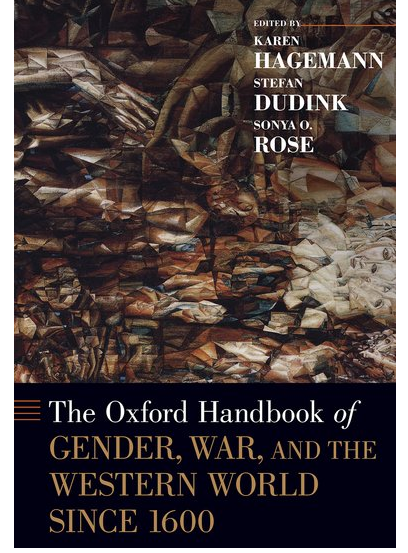This transatlantic roundtable launches the publication of The Oxford Handbook of Gender, War, and the Western World since 1600 , a comprehensive historical overview of the entangled relationships between gender, war and military culture, and remembers one of its three editors, Sonya O. Rose (1935-2020), who sadly died weeks before the book was published.
The roundtable will focus on the intersection of gender, war and citizenship, which is not only one of the major themes of the Oxford Handbook, but also of Sonya Rose’s work. It starts from her suggestion, to think of citizenship as ‘’a framework that serves as a basis for claims-making.” Citizenship, she wrote, is a discursive framework that enables people to make various political and other claims and shapes political subjectivities that get enacted in the process of claims-making. Deeply marked by gender, race and class, this framework of citizenship produces exclusions—and offers tools to contest these. War often comes with a particularly intense discourse and politics of citizenships, in which claims made by, and on, people get linked to the issue of national survival. The roundtable will explore the politics of citizenship in the context of military and war and ask how transformations of modern warfare have affected notions of citizenship and gender, and vice versa how historical and changing notions of citizenship and gender shaped military and war.
The participants of the roundtable will explore the wartime politics of citizenship in various historical and geographical contexts, ranging from late eighteenth-century Wars of Revolution and Independence to Word War II. Three sets of questions are central to their exploration:
- How have specific gender orders informed specific historical wars and types of war? How have, vice versa, specific historical wars and types of war shaped gender orders and gendered politics of citizenship in particular?
- How have wartime politics of citizenship been shaped by the intersection of categories of difference and inequality such as gender, race, and class?
- What were the long-term effects on gender orders of wartime politics of citizenship? What explains the persistence or subsiding of wartime reconfigurations of gender and citizenship?
Program:
Program
- Welcome
Berit Ebert, Vice President, American Academy Berlin
Jan Willem Duyvendak, Director, Netherlands Institute for Advanced Study in the Humanities and Social Sciences- Introduction: The Oxford Handbook of Gender, War, and the Western World since 1600—A Global Project
Karen Hagemann, University of North Carolina at Chapel Hill- Commemorative Address: Sonya O. Rose: A Transatlantic Gender Historian
Susan Grayzel, Utah State UniversityRoundtable: Gender, War and Citizenship
- Moderation: Karen Hagemann, University of North Carolina at Chapel Hill
- Participants
- Gender, War and Citizenship
Thomas Kühne, Clark University- Masculinity, War and Citizenship in 18th and 19th Century Europe
Stefan Dudink, Radboud University Nijmegen- Colonial Soldiers, Empire, and Male Citizenship in the Age of the World Wars
Richard Smith, Goldsmiths, University of London- The North American Home Front, Race and Citizenship
Kimberly Jensen, Western Oregon University
(source: UNC)

